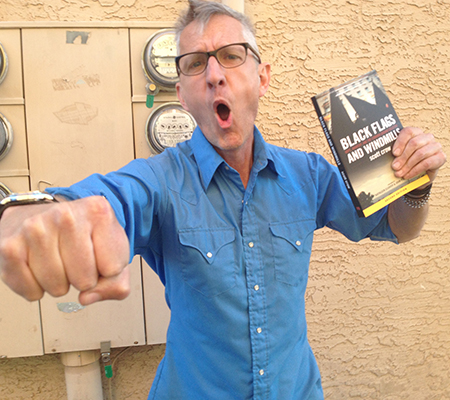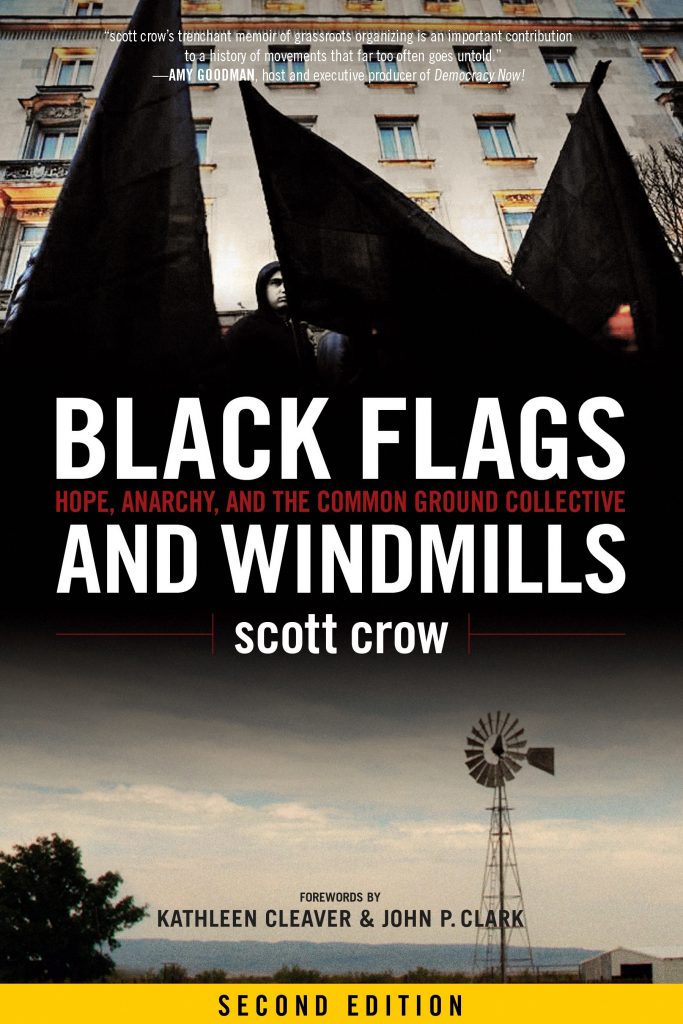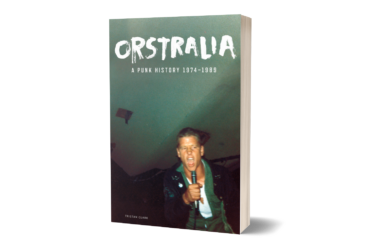by Nathan Diebenow
Diebenow.com
November 2011
It’s
not everyday that you get to hang out with a someone who toured with
Trent Reznor, or someone who co-organized the largest
anarchist-influenced organization in modern American history, or even
someone whom the FBI labeled a “domestic terrorist.” But the good folks
of Occupy Denton (Texas) and I had the opportunity to interact with all
three of these someones in the form of one scott crow this time last
month.
You might have heard of the FBI’s shenanigans against
crow and his friends from the New York Times in May or from Democracy
Now in June or from Rag Radio in August.
But if you haven’t
heard it, I highly recommend his Rag Radio interview not only because
crow speaks more on alternative economic systems but also because played
are clips of the political industrial dance music he co-created with
his former group Lesson Seven in Dallas in the late ’80s.
Had you
sat in on crow’s talk at Occupy Denton, you would have received a more
in-depth look at the last 20 years of his experiences organizing
communities—such as those at the University of North Texas (UNT) in the
anti-apartheid movement to those in New Orleans days after Hurricane
Katrina threw the gross racial and wealth inequalities of the region in
the face of the One Percent.
Because of the horrific police
actions against Occupy Oakland when veteran Scott Olson received serious
brain injuries on Oct. 25 following a general feeling among some
occupiers that the cops are also part of the 99 Percent, I intended to
speak with Crow about the Occupy movement’s relation to the State.
Thankfully, he also occupied the conversation toward the nature of
social movements and the history of previous organizing efforts that led
to the Occupy movement’s structure.
Here is the fruit of our 10-minute discussion after his talk at Occupy Denton on the UNT campus off Fry Street, tents and all:
…………
Diebenow: What
do you think about the “Occupy Police” wing of Occupy movement on
Facebook and Twitter? Are you skeptical about the solidarity that this
group espouses? Or are you hopeful that it will break the bubble that
surrounds the police?
crow: I’m absolutely
skeptical of that because one, the Occupy movement is super
decentralized. There’s no one voice in that. Anybody who purports to
speak for all the Occupy movements going on is total bullshit. Secondly,
I think one of the things we have to realize in this country is that
the police, like a lot of wealthy people who may be interested in what’s
going on, are never going to join these movements until it effects them
directly. People in upper middle class strata, like very upper middle
class strata at the top of the 99 Percent who feel like they don’t feel a
part of it, and the police, until it effects their bottom line, until
the banks are closed, until the ATMs are not working, until their checks
aren’t coming, their pensions are gon, then they will join the
movement. But the police are never going to side with us until that
happens. The police are paid to uphold private property of corporations,
corporations, and the state. That’s their job. I mean, that’s their
mandate. Given the order to shoot me, they’re going to do it. Is that
dramatic enough? (laughs) But it’s true.
Diebenow: What
you just described to me is basically like if you see any of those
things happening, you’ll be less skeptical. I mean, we’re talking
system-wide.
crow: Absolutely. Listen, there are
individual good cops. I’m not going to lie. I mean, I’ve dealt with
lots of them over the years, but I know ultimately their job—their
job—what they get paid for day-in and day-out—is to uphold the state.
They have loyalty to that whether they want to or not. They have
families to feed. They’re on a wheel, like a gerble wheel or a hampster
wheel, and they’re spinning in that. They are part of the system as much
as anybody is. They’re not separate from that, and they have to make
moral decisions based on that. So maybe that won’t shoot me dead, but
they might tear gas the hell out of me to make me stop what I’m doing if
it’s against their interests.
Diebenow: And that played out yesterday in Oakland. Even with the supposed “non-violent” weapon like rubber bullets.
crow: It’s
less lethal. I mean, I know you’re using quotation marks, but let’s be
clear about it. Rubber bullets are less lethal. They’re not non-lethal. I
know people who have been incredibly injured by them.
Diebenow: So
in the way it’s playing out right now nationwide, it’s kind of as you’d
expect it in terms of the reaction of the state with the Occupy
movement.
crow: Let’s really talk about what’s
important about the Occupy movement. You’re talking about a movement
that hasn’t happened in the United States in a long time—a decentalized
movement not controlled by any central organization or anything, where
people rose up because things were wrong all over. The tea party, which
was similar thing on the right-leaning spectrum, was always geared
toward funnelling people into the Republican Party, or it was quickly
co-opted by people that had interest in doing it, like Dick Armey who
used to be at the University of North Texas here.
But the Occupy
movements are totally decentralized. It’s 30 years of anarchist and
horizontal organizing coming to fruition, where you talk about General
Assembly, where you talk about concensus decisions, where you try to
hear the voices of the people who aren’t normally heard.
Are
there problems within that? Yeah, but that’s an amazing start for
something. All the Occupy movements—nobody is going around saying, “Hey,
you should start an occupy movement. You should start an occupy
movement.” People are doing it because they have the sense of need to do
that. That is what we should be talking about. Not the state
repression.
Fuck the state. If we stay clear on what we are doing, it doesn’t matter what the state does.
Do
you know what I mean? Our will—our political will is much stronger than
anything they can throw at us. They don’t call it struggle for nothing,
right? But we stay focused on what we’re doing, and it doesn’t matter
what they do.
Diebenow: I liked your point about the terms long-term revolution and little revolution. It’s almost like little struggles.
crow: They are.
Diebenow:
So this is a big revolution in the sense that it was long time coming,
but it is still in a sense little revolutions for individuals.
crow: It
is totally baby steps. Every movement that rises up, like the
alternative globalization movement that I was talking about that was a
decade ago, it’s the same thing. But what happens is that we have no
institutional memory because we don’t carry it from movement to
movement. So the hundreds of thousands of people that were in the
alternative globalization movement left, and there’s only a few of us
left, and we’re the ones who tell the stories so that the new people who
are rising up can (learn), and in 10 years, these people can tell the
stories.
Diebenow: I was listening to Amy
Goodman talk the other night, and she was saying how she studies
movements. And what was interesting was when you said you studied
revolutions. Is there a difference?
crow: Revolutions
are the idea that we have to overturn all of these things to make
things happen. Movements are what rises up when we try to make these
revolutionary situations, and the things that come out of them. I’m not
talking old school like we’re going to rise up one day, fight and then
we take state power. That’s not the kind of revolutions I’m talking
about. Actually, I don’t even know what they can look like. They’re
going to move faster in some areas and slower in other areas, but the
little mini-revolutions are happening daily. First it’s the wakening of
each and every one of us, and then us pulling together and doing things,
and then inheriting the other movements that came before us, and then
building on those futures, which we don’t even know what they’re going
to be yet. And I’m okay with that. I used to not because I wanted a
plotted out plan: “We’re going to do this, this and this. And then next
thing there is, we’re all free.” But that’s not going to happen.
But
what’s different with the Occupy movement is that nobody wants to
control anything. The tea party wanted to control things. I don’t want
to hit them with a broad stroke because I think that’s unfair, too,
because there’s a lot of legitimate people within the tea party
movement, and there was a huge spectrum of interest within that, right?
But ultimately when they got funnelled in, they wanted to control what
happened in the new store. We don’t want to control that. We want to
create new worlds from below and from the left that we don’t even know
what they are. We’re imagining something different, and people are
waking up and trying to reimagine what those worlds are. We’ve all been
in these cages that we can’t see, and people are waking up, starting to
go, “Wow. I’m not in that cage, but what is it like to be free? I knew
what I could do inside the cage, but now I have to figure out . . . ”
And those paths are much harder. That’s where I come to that thing
“walking and asking.” So you continue to ask questions along the
way. And the thing is, these are the modern revolutions. The
Zapatistas set that up, where you didn’t have to have the answers
because we don’t have the answers, and that makes us have fallible but
human revolutions on a global scale.
Diebenow: One final thought: the Occupy movement has created an alternative government.
crow: If
you think about it, the Occupy movement in city after city, they are
practicing democracy— direct democracy—not where you’re voting your life
away for somebody 3,000 miles away from you who is going to tell you
what to do. You’re actually practicing it. And that takes a lot of time.
We’ve been resisting for so long, and we need to build. Our resistance
arm is totally muscular and really strong, but our building arm is
totally atrophied because we’ve ignored it. Now we’re beginning to
practice building it. It is like alternative governments and alternative
societies. We have to re-imagine it. It’s baby steps. Just because not
everybody is on board with some clear agenda is beautiful to me because
it shows the openness and the willingness to really think about it and
let it stew. In all the movements like in Argentina and what rose up in
Chiapas, Mexico, that’s what’s happened with people. The uprising in
Chiapas, Mexico, in 1994 was 20 years in the making. Twenty years they
talked about it before they decided to do that.
Diebenow: In a wider sense, is this like an Abraham Lincoln Brigade? Is that movement part of this movement’s history as well?
crow:
You’re talking the Spanish Civil War. That’s a totally different thing.
That was a clear enemy. They were fighting against fascism and for
anarchism and socialism. This is way different than that. I wouldn’t
compare it to that at all. I would compare it to Argentina in 2000, and
before that, I would compare it to Central American movements in the
1970s. It’s people’s uprisings. The thing is, there’s no leaders to
telling people they should up-rise. There’s no Communist Party. There’s
no Socialist Party. And everybody doesn’t want a socialist state.
That’s
not what I want. I’m not trying to build a socialist state. I want to
abolish the state. I want us to build grassroots power. I want to take
the longest, hardest path that we can find to figure out what it’s going
to be. I don’t want an easy answer because easy answers end up with
dictators and fascists.
-FIN-







